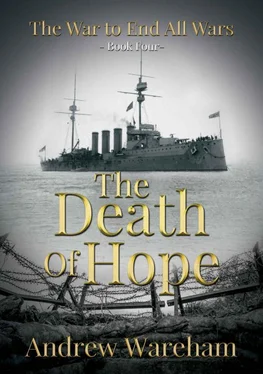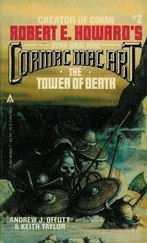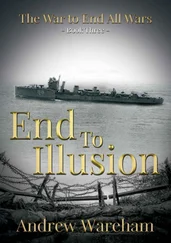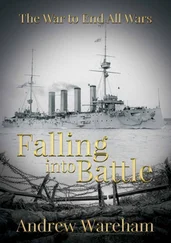“What of the sea, Captain Sturton? Have we regained command of the oceans?”
“No, sir. The submarine is the menace. We have no way of discovering submarines under the surface. We will see far more losses to the boats over the coming years.”
Conversation became increasingly gloomy as they concluded that the country was close to losing the war.
“Is there a way to win, Captain Sturton?”
“Not in France, sir. New weapons, and I have no idea what they might be, could possibly bring a breakthrough. At present, there is stalemate. The defence is stronger than the offence. If there is to be a victory, then it must take place elsewhere than in Flanders.”
The Viscount offered an insight.
“Germany is short of foodstuffs for her large population. As are we, of course. We can bring wheat from America, provided the submarines do not sink too much. Germany has no outside source, unless the Kaiser can take the whole of Poland and the Steppes and pull harvests from them. Our blockade may be the answer.”
“To starve the Hun rather than to defeat them in open war, you say, my lord.”
“It seems so, sir.”
It was no way to fight a war. Where was the honour?
“Can the cavalry not be released, my lord? Fifty regiments of horse must turn the war in our favour.”
“The cavalry has no part to play in France, sir. They are irrelevant, in fact. The war is between artillery and infantry. Horse has nothing to say.”
That was an obvious nonsense. Cavalry won wars. The infantry was to hold the ground they took; the artillery played its role in sieges and in set-piece battles. That had been the case since the days of the Iron Duke. How could war have changed now?
“We have invented barbed wire and the machine gun, sir. The two between them have made the horse irrelevant. Add to that, the power of modern great guns and you will see that we now have an entirely new warfare. The cavalry is all about the offensive. It is the defence that holds the new power. It is worth noticing, of course, that the French cavalry achieved nothing at Waterloo. One might consider the Charge of the Light Brigade as well.”
They could not understand his last comment. The Charge had been a magnificent example of true British heroism. It had succeeded in its failure! The last statement was often made, they knew – and few chose to question it or to attempt to understand it.
They became almost impatient with Lord Perceval – England must win. Anything else was inconceivable. The Empire On Which The Sun Never Set – always with capital letters – was not to be defeated by a mere crippled Kaiser. It was up to government and military to remember that reality and take the correct course of action, which must be there to be found.
“Then how do we win in France, my lord?”
“We wait, sir. Eventually, one trusts, the blockade of Germany will force them to desperation. At that point they must talk or they must mount a massive attack. If they go onto the offensive, they may well take ground; they will lose hundreds of thousands of irreplaceable men.”
“Years of stalemate on the Western Front, my lord! That is not the course of honour! We must advance!”
Simon gave an appraising glance at the little, fat, red-faced sixty year old who had never risked his own precious life in war, took pains not to allow his contempt to show. It was easy for those at home to shout for the path of duty and honour as the sole way forward.
“It is better than futile deaths on the wire, sir. The trenches are impregnable under current conditions. Create new weapons and it may be possible to breach them. At the moment, it is not.”
They joined the ladies, found them discussing the poverty of goods available in the better stores. They did not know what the world was coming to, it seemed.
“Captain Sturton! How long will it be before these appalling submarines are swept from the seas?”
“Many years, ma’am. We have yet to discover the means of destroying them. Our sole hope is to keep them at a distance by patrol. We have too few ships to provide safe passage of the Atlantic.”
“I had always thought Britannia to rule the waves, Captain Sturton!”
“One, perhaps, of many delusions we suffered before this war, ma’am. We are doing our very best, I assure you. It is not impossible that the policies of governments before the war will be shown to have been misguided. The dreadnought is not the be all and end all of sea power, it would seem.”
That was a statement akin to blasphemy. The ladies stared and rapidly turned the conversation to topics less distressing.
The party broke up eventually and the remaining gentlemen found themselves downstairs alone, a last whisky to hand.
“Saying that the dreadnought might not be the greatest of warships, capable of winning the war for us, Simon! Shocking!”
The Viscount shook his head in mock horror.
“What have you against the great battleships, Simon, other than being a small ships man yourself?”
“Rusting piles of magnificence, sir, sat in Scapa Flow and doing what? How have the battleships contributed to this war, sir? They are a liability, hidden away from submarine and minefield and doing nothing to kill Germans. That, after all, is what the war is about, and the overwhelming number of our battleships have never so much as seen a Hun. They cost money and waste manpower and do nothing. They are not even a threat, because we all know they will never sail unless the German High Seas Fleet moves first. They are in a defensive role, solely. If we fear the High Seas Fleet, then we should build more submarines and place them to patrol off the Kiel Canal. The best thing we could do with the battleships is to disarm them, to send their guns to where they could be useful. Put them aboard railway trains behind the Trenches, there to provide the poor men in the lines with the artillery they need.”
“A radical proposal, Simon. I fear that the politicians could never accept it. They have spent tens of millions on building the battleship fleet – they cannot now say it is useless. It has to be the weapon that will win us the war, at least as far as the newspapers are concerned.”
They retired, wondering in just how many other houses in the country the same words were being said and ignored by the nation’s leaders.
Simon returned to the war refreshed, knowing that his next long leave would see him married. He rather thought he would welcome that. He was called to Commodore Tyrwhitt as soon as he appeared aboard the depot ship.
“Your Canning has risen in the world, as expected, Sturton. Gone in command of Lairgs, in one of the Queensferry flotillas. You have a solid man in his place, Strachan, come down from Scapa, senior in a light cruiser flotilla leader there. Knows the work in theory and a good seaman – you know what the weather is like up there, half a gale more often than not. Scots, but not uncouth with it. Malcolm is a commissioned engineer now and has responsibilities in the half-flotilla – they will report to him before going to the dockyard with their troubles. I expect him to stay with you for a year or so before being given another stripe and put into a light cruiser.”
“Glad to hear that, sir. Malcolm is one of the best.”
“So I have noticed from your personal reports on the man. Now, the yard has given you a better searchlight and has improved your wireless installation. You should be able to contact Harwich from the Dutch borders. As far as an aircraft gun is concerned, they have taken away your Maxim, which is a bit on the old-fashioned side, these days. They have replaced it with a sort of lashed-up experiment, to my mind. It is set up for high-angle use and can be fired as part of the broadside as well – a dual mounting. Thing is, Sturton, it’s French! A Hotchkiss cannon, a bit less than a two incher, they call it a thirty-seven. About a two pounder. The shells come in strips which the loader feeds in. They fire automatically once in. Eight at a time. If the loader could get them in fast enough, I should imagine you could fire thirty or forty rounds a minute.”
Читать дальше












